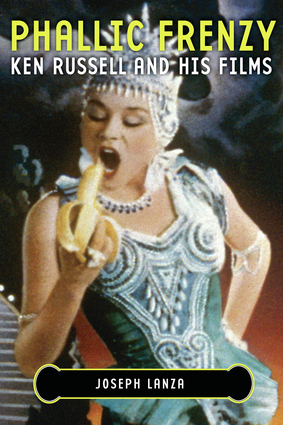 By JOSEPH LANZA (Chicago Review Press; 2007)
By JOSEPH LANZA (Chicago Review Press; 2007)
This isn’t the first book about the English cinema’s premiere enfant terrible Ken Russell, but it is very likely the best. That’s largely due to the simple fact that the others—which include Joseph Gomez’s KEN RUSSELL (1976), John Baxter’s AN APPALLING TALENT (1973) and Russell’s own A BRITISH PICTURE (a.k.a. ALTERED STATES; 1992)—were all published some time ago, while this one is at least up-to-date. In a life and career as incident-filled as Russell’s, there are always new and interesting developments to be taken into account by any prospective biographer, and author Joseph Lanza is more than up to the task.
Ken Russell’s films include crazed gems like MAHLER, TOMMY, ALTERED STATES, THE LAIR OF THE WHITE WORM, WHORE and many others. All are characterized by an unapologetically scatological sense of humor, graphic violence, an overall obsession with sex and a probing intellectuality that often gets overlooked by prudish critics. I consider Russell one of the great unfettered geniuses of the cinema, and this book at last puts his work in its proper perspective.
Joseph Lanza is best known to me for FRAGILE GEOMETRY, a wildly idiosyncratic study of the life and films of the British moviemaker Nicolas Roeg (complete with a chapter comparing Roeg with Ed Wood!). PHALLIC FRENZY is a far more traditional account, related in standard biographical fashion and in strict chronological order, though with a definite laudatory point of view. Lanza, in other words, is a fan of Ken Russell’s films, and unafraid to challenge the prevailing critical sentiments on underrated Russell freak-outs like GOTHIC and LISZTOMANIA, both apparently “excessive” and “scandalous”. Well yes, they are those things, but there’s far more to them.
The author thankfully doesn’t dwell overmuch on his subject’s childhood. Rather, he keeps the opening chapters concise, relating how the youthful Russell, growing up in the English town of Southampton, was traumatized for life by a film called THE SECRET OF THE LOCH, along with warring parents and an ill-advised teenaged stint in the Royal Navy, during which he was bullied mercilessly.
Russell later thrived making films for the BBC, creating scandalous, rule-breaking works like DELIUS: SONG OF SUMMER, ELGAR and DANTE’S INFERNO. His first feature of note was BILLION DOLLAR BRAIN, a Michael Caine-headlined inversion on traditional James Bond themes that was a box-office flop. It was followed by the tasteful and refined WOMEN IN LOVE, which conventional wisdom would have us believe is Russell’s “masterpiece.”
To his credit Lanza refutes that notion, treating WIL as at best a warm-up to the unforgettable 1970 Tchaikovsky biopic THE MUSIC LOVERS and 1971’s taboo-shattering THE DEVILS, in my view Russell’s true masterwork. It’s gratifying to find that Lanza agrees with me about the importance of THE DEVILS to Russell’s filmography, writing that it was “his hardest labor, his consummate masterpiece, his CITIZEN KANE. Now (Russell) started fearing that the bloom was off the Rosebud.”
Ken Russell would of course go on to make many more unforgettable films throughout the seventies and eighties, and Lanza is careful to mention them all, even if his coverage at times amounts to little more than a paragraph or two (Russell’s hilarious South Bank Show autobiography, for instance, is given scant attention). We also learn about Russell’s forays into opera and novel-writing (with the outrageous futuristic Biblical pastiche VIOLATION, which I recommend), and various Ken Russell projects that never came to fruition. These include a Sarah Bernhardt biopic starring Barbara Streisand, a Bob Guccione produced adaptation of MOLL FLANDERS, and a sequel to THE LAIR OF THE WHITE WORM.
Lanza does his best to close the book on an optimistic note, with Russell turning his back on conventional filmmaking and distribution practices to pursue his own unique vision in the homemade ventures THE FALL OF THE LOUSE OF USHER (2001) and HOT PANTS (2006). Still, the prognosis is pretty grim, with Russell finding himself persona non grata at all the major studios and reduced to looking for a mate on the internet in the wake of three failed marriages. Yes, an eligible woman, the American Elize Tribble, did respond to his online proposal (“Unbankable film director Ken Russell seeks soul mate–mad about movies, music and Moet et Chandon champagne”) and the marriage commenced. The coupling apparently remained strong throughout the remainder of Russell’s life, although his movie career definitely didn’t.
